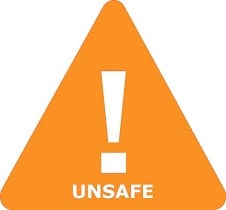Is Fucus Safe in Breastfeeding
Question
I am a breastfeeding mother and i want to know if it is safe to use Fucus? Is Fucus safe for nursing mother and child? Does Fucus extracts into breast milk? Does Fucus has any long term or short term side effects on infants? Can Fucus influence milk supply or can Fucus decrease milk supply in lactating mothers?
Fucus lactation summary

- DrLact safety Score for Fucus is 5 out of 8 which is considered Unsafe as per our analyses.
- A safety Score of 5 indicates that usage of Fucus may cause serious side effects in breastfed baby.
- Our study of different scientific research indicates that Fucus may cause moderate to high side effects or may affect milk supply in lactating mother.
- Our suggestion is to use safer alternate options rather than using Fucus .
- It is recommended to evaluate the advantage of not breastfeeding while using Fucus Vs not using Fucus And continue breastfeeding.
- While using Fucus Its must to monitor child for possible reactions. It is also important to understand that side effects vary largely based on age of breastfed child and time of medication in addition to dosage.
- Score calculated using the DrLact safety Version 1.2 model, this score ranges from 0 to 8 and measures overall safety of drug in lactation. Scores are primarily calculated using publicly available case studies, research papers, other scientific journals and publically available data.
Answer by Dr. Ru: About Fucus usage in lactation
Seaweed. The stem of the plant is used.It contains large amounts of mucilage and minerals, including iodine which appears in variable amounts that can be significant, in such a way that it may be a cause a hyperthyroidism-like disease (anxiety, insomnia, tachycardia, palpitations).It may also contain heavy metals, being a species of seaweed with a high ability of contamination by toxic products. The commission E of the German Health Ministry has not approved any clinical indication, discouraging its use. At latest update no published data on excretion into breast milk were found. However, there is information from other algae whose consumption is known to increase iodine levels in the plasma and breast milk.There have been reports of hypothyroidism in infants whose mothers have included in their diet important quantities of seaweed. There is no evidence of effectiveness on increasing milk production. The most effective method to increase milk production should be done by strengthening maternal self-confidence, evaluate and correct problems along with an effective support to breastfeeding mothers.
Alternate Drugs for Phytotherapy, Systemic Use
Chasteberry(Unsafe)
Chamomile(Safe)
Echinacea(Low Risk)
Alfalfa(Unsafe)
Dong Quai(Low Risk)
Cranberry(Safe)
Licorice(Unsafe)
Rhubarb(Low Risk)
Lavender(Low Risk)
Sweet Briar(Safe)
Barberry(Dangerous)
Carob(Safe)
Common Poppy(Unsafe)
Angelica(Unsafe)
Star Anise(Dangerous)
Mugwort(Unsafe)
Edible Burdock(Low Risk)
Box(Unsafe)
Boldo(Unsafe)
Bromelains(Safe)
Calaguala(Safe)
Caralluma(Low Risk)
Carrageen(Low Risk)
Horse Chestnut(Safe)
Blue-Cohosh(Dangerous)
Indian Pennywort(Safe)
Squisandra(Low Risk)
Prickly Pear(Safe)
Black-Cohosh(Unsafe)
Horsetail(Unsafe)
Colocynth Pulp(Dangerous)
Ergot Fungus(Dangerous)
Ephedra(Unsafe)
Steviol(Safe)
Eucalyptus(Unsafe)
Eyebright(Safe)
Flowers(Low Risk)
Goat´s Rue(Unsafe)
Bearberry(Unsafe)
Guarana(Low Risk)
Devil’s Claw Root(Low Risk)
Herniary(Low Risk)
St. John´s Wort(Safe)
Hyssop(Unsafe)
Syrup Of Ipecac(Low Risk)
Jin Bu Huan(Dangerous)
Kava Kava(Dangerous)
Clubmoss(Unsafe)
Maca(Safe)
Common gromwell(Unsafe)
Nux Vomica(Dangerous)
White Nettle(Safe)
Papain(Low Risk)
Passion Flower(Low Risk)
African Cherry(Dangerous)
Scots Pine(Unsafe)
Pycnogenol(Safe)
Pennyroyal(Unsafe)
Primrose(Safe)
Radish(Safe)
Ironwort(Low Risk)
Liquorice(Unsafe)
Rooibos(Safe)
Rose Hip(Safe)
French rose(Safe)
Butcher´s Broom(Safe)
Willow(Safe)
Soy(Low Risk)
Herbal Teas(Low Risk)
Rock Tea(Low Risk)
Lime Flower(Safe)
Tormentil(Safe)
Meadow-Sweet(Low Risk)
Golden Rod(Safe)
Sarsaparilla(Low Risk)
Sweet Flag(Unsafe)
Saw palmetto(Low Risk)
Common gum cistus(Low Risk)
Cat's Claw(Low Risk)
Milk Vetch(Low Risk)
Chinese angelica(Low Risk)
White Mulberry(Low Risk)
Di Huang(Low Risk)
Zi Wan(Unsafe)
Dang Shen(Low Risk)
Reishi(Low Risk)
glycyrrhizic acid(Unsafe)
Glycyrrhizin(Unsafe)
American cranberry(Safe)
Carrageenan(Low Risk)
Carrageenin(Low Risk)
Verbena officinalis(Low Risk)
Passion Vine(Low Risk)
Chaste Tree(Unsafe)
Sweet Cane(Unsafe)
Sweet root(Unsafe)
Irish Moss(Low Risk)
Bromelain(Safe)
Bromelin(Safe)
Acorus calamus(Unsafe)
